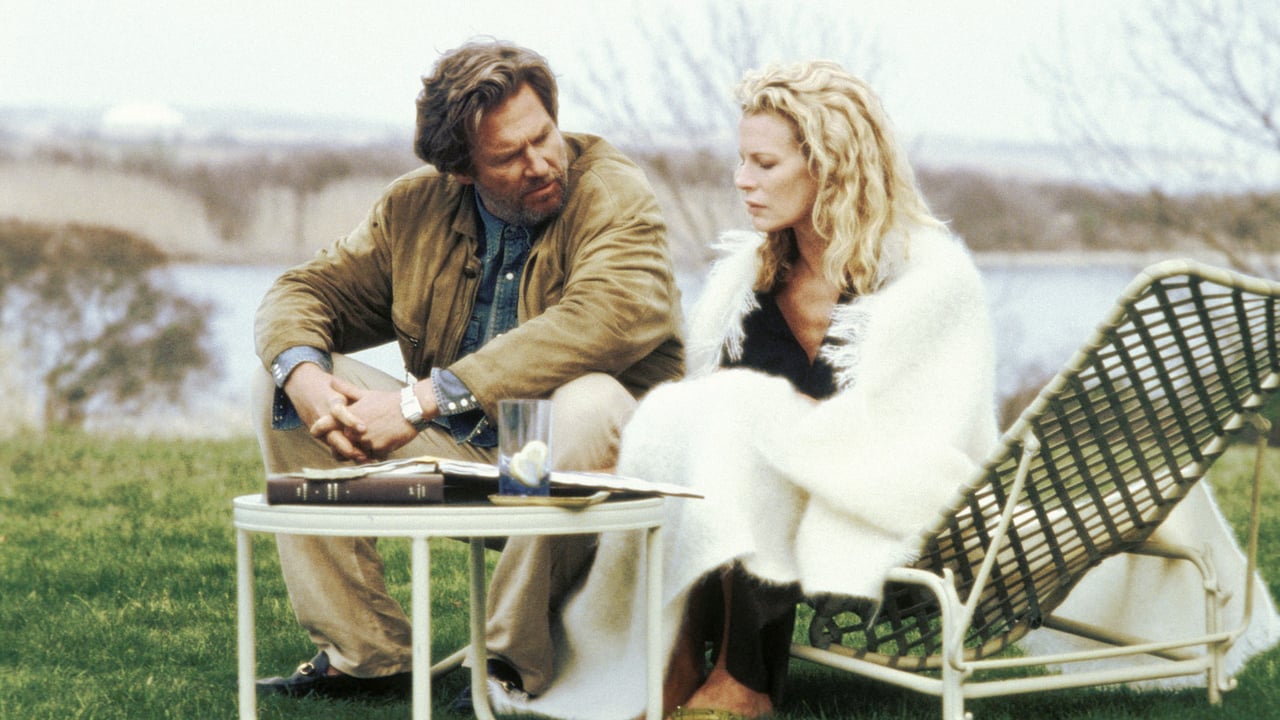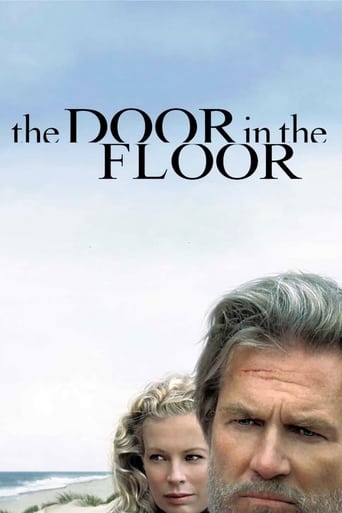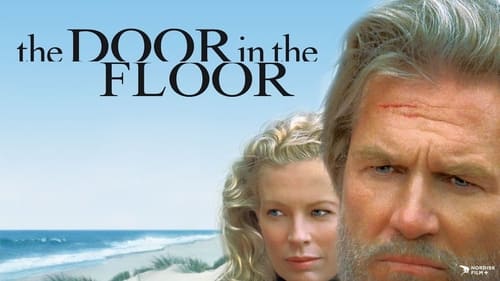


Very interesting film. Was caught on the premise when seeing the trailer but unsure as to what the outcome would be for the showing. As it turns out, it was a very good film.
... View MoreAlthough I seem to have had higher expectations than I thought, the movie is super entertaining.
... View MoreBy the time the dramatic fireworks start popping off, each one feels earned.
... View MoreThe movie really just wants to entertain people.
... View MoreTed Cole (Jeff Bridges) is a famous writer but his marriage to Marion (Kim Basinger) is in major difficulties after suffering a tragedy. They live in a northeast beach community with their daughter Ruth (Elle Fanning). Alice (Bijou Phillips) is the nanny. Eddie O'Hare (Jon Foster) arrives to be an intern for Ted and quickly has an affair out in the open with Marion. Ted has his own affair with his sketch model Evelyn Vaughn (Mimi Rogers).This is a family quietly suffering. I guess that's the point of the movie. It's like sharing in their unresolved issues. I don't really connect with any of the characters. Everything is muted. The emotions are bubbling under the surface most of the time. I appreciate this movie for what it is but there isn't much enjoyment in it.
... View MoreI spent the first half of this movie utterly despising it, but in the end I admit it's a good movie. If you're not easily offended.The story revolves around the extremely dysfunctional marriage (and not in a funny way either) between a couple surviving the wreckage of a tragedy. A writer (Jeff Bridges) and his often catatonically depressed wife (Kim Basinger) are failing miserably at raising their young child (Elle Fanning). Failing miserably is the understatement of the year. Their actions border on child abuse including overt extramarital affairs, leaving the bedroom door wide open so that their 4-year-old daughter witnesses sex doggie style, leaving her unattended or generally ignored much of the time resulting in serious accidents, and (although this is debatable depending on how open you are with your kids) walking around butt naked. Oh, maybe I should mention that one of them commits statutory rape. 60 times.If you can get past that, you're in the clear.You soon realize, or should soon realize, that this is the story of some individuals who are using tragedy to excuse their selfishness while obliviously wreaking havoc on a small child's mind. And that is the central theme of the film and the key to understanding the cryptic reference of the title "The Door in the Floor".As you can see, this is a very challenging and possibly controversial story. In that respect it reminds me of the Terry Gilliam film "Tideland" which revolves around a 30-year-old man's relationship with a pre-teen girl; the audience is supposed to be disturbed, and yet we are supposed to dig deeper past the shock to understand the meaning.So if you watch this movie, don't spend your time trying to figure out who's the "good guy" like I did, or you'll find yourself hating the experience. Instead take it for what it is: the story of some very flawed individuals stumbling through life the only way they know how.Due to the extremely awkward sexual situations, I do NOT recommend this as a date movie, a romantic evening with your hubby/wife, and for the love of Moses do NOT watch this movie with your kids. Or your parents.
... View MoreThis movie got off to a promising start in its depiction of Jeff Bridges's self-centered Ted, a womanizer who never gives much thought to his serial manipulations. However, "The Door" quickly deteriorates into a ripoff of "The Summer of '42" and the real-life Mary Kay Letourneau story as Ted's depressed wife Marion (Kim Basinger) is set up to seduce the horny high-school student Ted has brought into the home for the summer. As pretty as Basinger is, I didn't believe for a minute that Eddie would fall for her instead of the family's sexy young nanny or all the nubile young girls we're shown on the Hamptons beach. The movie made me cringe when we witness Eddie's attempts at masturbation, and I finally deleted the film once Marion walked in and he was too ashamed to face her. I may be biased but I don't think people go to the movies to squirm through this kind of trash. Admittedly I am the parent of a teenager and a pre-teen, but I found the intrusiveness of these scenes to be highly distasteful. If kids are going to explore their own bodies, please directors of the world, let them do so in privacy and dignity! I also found it offensive to have little Ruth, who looks to be about 4, tell her father, "your penis looks funny." I guess we're supposed to assume she saw Ted's erection -- another violation of a child's boundaries. This actress is a tiny little girl. Why was it necessary to give her this dialog? Call me a prude if you like but I found this movie to be so disrespectful to children that I lost interest in any surrounding storyline involving the presumptive grown-ups in the tale.I'm surprised that Jeff Bridges, an actor I've always respected, would allow himself to appear in garbage like this.
... View MoreI just watched this movie again tonight, years after seeing it when it first came out. So what is the meaning behind "The Door in the Floor" which child story writer Ted Dole refers to in his haunting tale? One major clue comes from the final scene of the movie when Jeff Bridges' character is left as the sole adult in his house. After playing an exhausting solo game of racketball, he breaks down emotionally. Only at that moment, do we discover that the door in the floor is not just a made up place in his children's book but a very real and secret place hidden deep inside his house. After struggling emotionally, he finally surrenders to the mysterious pull slowly opens the door, crawls into the dark open space looking like a ghost and the door slowly closes on him, swallowing him whole. To me, the door in the floor is this ugly, horrific dark place some people have carved inside of them as a coping mechanism for whatever traumatic event they have endured. It is that place where they are alone with the pain and are confronted to the memories with no place to hide. I suppose some people would refer to it as post traumatic disorder. I find it fascinating that Ted's tale is told from the mother's perspective, and not the father's. This important detail to me demonstrates the untold, only evoked depth of his love and compassion for his wife as he chooses to focus on her pain (instead of his). In his tale, I believe he shows a clear understanding of what his wife has been going through the years and is still struggling with: The grieving mother of two dead sons haunted by her third child's mortality. Another important detail that strikes me is that in the tale, the mother opened the door but never actually went through it: instead, she closed the door, never to reopen it again. In the tale, her hair turned permanently white. This to me relates to his wife having lived through the trauma of the car accident first-hand and never being able to deal with and relate emotionally to that fatal day (turning to stone when she was asked how her sons died). Her decision to not go through the door in the floor has prevented her from moving on, she's simply been frozen in time and space since that horrible day. Jeff Bridges' character on the other hand has found a different coping mechanism. He too is struggling and suffering tremendously yet by acknowledging the door in the floor and visiting that dark place every now and then, he has been able to stay connected to the world around him (no matter how scandalous and outrageous his behavior might be at time). Excellent. Stunning and poignant piece of work.
... View More